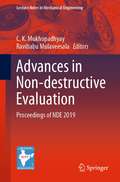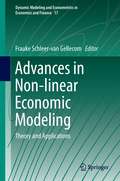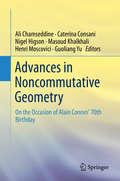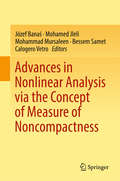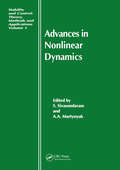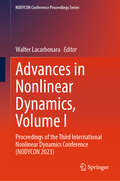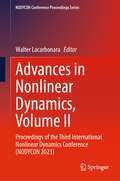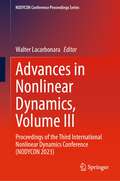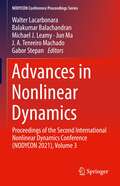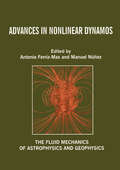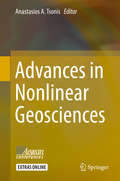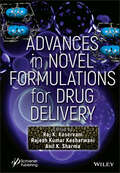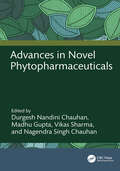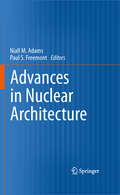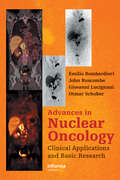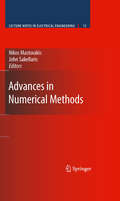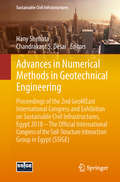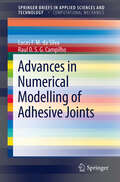- Table View
- List View
Advances in Non-destructive Evaluation: Proceedings of NDE 2019 (Lecture Notes in Mechanical Engineering)
by C. K. Mukhopadhyay Ravibabu MulaveesalaThis book comprises the proceedings of the Conference and Exhibition on Non Destructive Evaluation, (NDE 2019). The contents of the book encompass a vast spectrum from Conventional to Advanced NDE including novel methods, instrumentation, sensors, procedures and data analytics as applied to all industry segments for quality control, periodic maintenance, life estimation, structural integrity and related areas. This book will be a useful reference for students, researchers and practitioners.
Advances in Non-linear Economic Modeling: Theory and Applications (Dynamic Modeling and Econometrics in Economics and Finance #17)
by Frauke Schleer-van GellecomIn recent years nonlinearities have gained increasing importance in economic and econometric research, particularly after the financial crisis and the economic downturn after 2007. This book contains theoretical, computational and empirical papers that incorporate nonlinearities in econometric models and apply them to real economic problems. It intends to serve as an inspiration for researchers to take potential nonlinearities in account. Researchers should be aware of applying linear model-types spuriously to problems which include non-linear features. It is indispensable to use the correct model type in order to avoid biased recommendations for economic policy.
Advances in Noncommutative Geometry: On the Occasion of Alain Connes' 70th Birthday
by Guoliang Yu Ali Chamseddine Caterina Consani Nigel Higson Masoud Khalkhali Henri MoscoviciThis authoritative volume in honor of Alain Connes, the foremost architect of Noncommutative Geometry, presents the state-of-the art in the subject. The book features an amalgam of invited survey and research papers that will no doubt be accessed, read, and referred to, for several decades to come. The pertinence and potency of new concepts and methods are concretely illustrated in each contribution. Much of the content is a direct outgrowth of the Noncommutative Geometry conference, held March 23–April 7, 2017, in Shanghai, China. The conference covered the latest research and future areas of potential exploration surrounding topology and physics, number theory, as well as index theory and its ramifications in geometry.
Advances in Noninvasive Food Analysis (Contemporary Food Engineering)
by Muhammad Kashif Iqbal KhanTo ensure food quality and safety food, professionals need a knowledge of food composition and characteristics. The analysis of food product is required for quality management throughout the developmental process including the raw materials and ingredients, but food analysis adds processing cost for food industry and consumes time for government agencies. Advances in Noninvasive Food Analysis explores the potential and recent advances in non-invasive food analysis techniques used to ensure food quality and safety. Such cost-reducing and time-saving non-destructive food analysis techniques covered include, Infrared, Raman Spectroscopy, and Nuclear Magnetic Resonance. The book also covers data processing and modelling. Features: Covers the advent of non-invasive, non-destructive methods of food analysis Presents such techniques as near and mid infrared, Raman Spectroscopy, and Nuclear Magnetic Resonance Describes the growing role of nanotechnology in non-invasive food analysis Includes image analysis and data processing and modelling required to sort out the data The prime for this book are food professionals working in industry, control authorities and research organizations that ensure food quality and safety as well as libraries of universities with substantial food science programs, food companies and food producers with research and development departments. Also available in the Contemporary Food Engineering series: Advances in Food Bioproducts, Fermentation Engineering and Bioprocessing Technologies , edited by Monica Lizeth Chavez Gonzalez, Nagamani Balagurusamy, Christobal N. Aguilar (ISBN 9781138544222) Advances in Vinegar Production, edited by Argyro Bekatorou (ISBN 9780815365990) Innovative Technologies in Seafood Processing, edited by Yesim Ozogul (ISBN 9780815366447)
Advances in Nonlinear Analysis via the Concept of Measure of Noncompactness
by Józef Banaś Mohammad Mursaleen Mohamed Jleli Bessem Samet Calogero VetroThis book offers a comprehensive treatment of the theory of measures of noncompactness. It discusses various applications of the theory of measures of noncompactness, in particular, by addressing the results and methods of fixed-point theory. The concept of a measure of noncompactness is very useful for the mathematical community working in nonlinear analysis. Both these theories are especially useful in investigations connected with differential equations, integral equations, functional integral equations and optimization theory. Thus, one of the book's central goals is to collect and present sufficient conditions for the solvability of such equations. The results are established in miscellaneous function spaces, and particular attention is paid to fractional calculus.
Advances in Nonlinear Dynamics
by S. Sivasundaram A. A. MartynyukDedicated to Professor S. Leela in recognition of her significant contribution to the field of nonlinear dynamics and differential equations, this text consists of 38 papers contributed by experts from 15 countries, together with a survey of Professor Leela's work. The first group of papers examines stability, the second process controls, and the third section contains papers on various topics, including solutions for new classes of systems of equations and boundary problems, and proofs of basic theorems. Many of the featured problems are associated with the ideas and methods proposed and developed by Professor Leela.
Advances in Nonlinear Dynamics and Control of Mechanical and Physical Systems: Selected Articles from CSNDD 2023; 15–17 May; Marrakesh, Morocco (Springer Proceedings in Physics #301)
by Mohamed BelhaqThis book highlights recent advances in nonlinear dynamics and control with applications in mechanics and physics. The book includes selected articles from the 5th Conference on Structural Nonlinear Dynamics and Diagnosis (CSNDD 2023) and presents recent theoretical, experimental and numerical findings covering various topics in nonlinear structural dynamics and diagnosis. The main topics includes multiple scales dynamics, energy harvesting, dynamics of MEMS, NEMS and AFM, systems with time delay, quasi-periodic oscillations and synchronization, stochastic dynamics, analytical and semi-analytical methods, time series analysis, control and analysis of switching systems, structural health monitoring, nonlinear vibrations of structures, nonsmouth dynamics, nonlinear phenomena in discrete and continuum systems, dynamic modeling and fault diagnosis, constrained multi-catenary systems, conservative chaotic system, hysteretic structures, and nonlinear PDEs and their dynamics.
Advances in Nonlinear Dynamics, Volume I: Proceedings of the Third International Nonlinear Dynamics Conference (NODYCON 2023) (NODYCON Conference Proceedings Series)
by Walter LacarbonaraThis volume aims to present the latest advancements in experimental, analytical, and numerical methodologies aimed at exploring the nonlinear dynamics of diverse systems across varying length and time scales. It delves into the following topics:Methodologies for nonlinear dynamic analysis (harmonic balance, asymptotic techniques, enhanced time integration)Data-driven dynamics, machine learning techniquesExploration of bifurcations and nonsmooth systemsNonlinear phenomena in mechanical systems and structuresExperimental dynamics, system identification, and monitoring techniquesFluid-structure interactionDynamics of multibody systemsTurning processes, rotating systems, and systems with time delays
Advances in Nonlinear Dynamics, Volume II: Proceedings of the Third International Nonlinear Dynamics Conference (NODYCON 2023) (NODYCON Conference Proceedings Series)
by Walter LacarbonaraThis second of three volumes presents papers from the third series of NODYCON to be held in June of 2023. The conference papers reflect a broad coverage of topics in nonlinear dynamics, both traditionally placed in established streams of research as well as they stand as newly explored and emerging venues of research. These include• Multi-scale dynamics: multiple time/space scales, large system dynamics• Experimental dynamics: benchmark experiments, experimental methods,instrumentation techniques, measurements in harsh environments, experimentalvalidation of nonlinear models• Reduced-order modeling: center manifold reduction, nonlinear normal modes, normalforms• Systems with time and/or space delays• Nonlinear interactions in multi-dof systems: parametric vibrations, multiple external andautoparametric resonances.• Computational techniques: efficient algorithms, use ofsymbolic manipulators, integrationof symbolic manipulation and numerical methods, use of parallel processors.• Nonlinear system identification: parametric/nonparametric identification, data-drivenidentification• Multibody dynamics: rigid and flexible multibody system dynamics, impact and contactmechanics, tire modeling, railroad vehicle dynamics, biomechanics applications,computational multibody dynamics• Fluid/structure interaction• Nonlinear wave propagation in discrete and continuous media
Advances in Nonlinear Dynamics, Volume III: Proceedings of the Third International Nonlinear Dynamics Conference (NODYCON 2023) (NODYCON Conference Proceedings Series)
by Walter LacarbonaraThis third of three volumes presents papers from the third series of NODYCON to be held in June of 2023. The conference papers reflect a broad coverage of topics in nonlinear dynamics, both traditionally placed in established streams of research as well as they stand as newly explored and emerging venues of research. These include• Multi-scale dynamics: multiple time/space scales, large system dynamics• Experimental dynamics: benchmark experiments, experimental methods,instrumentation techniques, measurements in harsh environments, experimentalvalidation of nonlinear models• Reduced-order modeling: center manifold reduction, nonlinear normal modes, normalforms• Systems with time and/or space delays• Nonlinear interactions in multi-dof systems: parametric vibrations, multiple external andautoparametric resonances.• Computational techniques: efficient algorithms, use ofsymbolic manipulators, integrationof symbolic manipulation and numerical methods, use of parallel processors.• Nonlinear system identification: parametric/nonparametric identification, data-drivenidentification• Multibody dynamics: rigid and flexible multibody system dynamics, impact and contactmechanics, tire modeling, railroad vehicle dynamics, biomechanics applications,computational multibody dynamics• Fluid/structure interaction• Nonlinear wave propagation in discrete and continuous media
Advances in Nonlinear Dynamics: Proceedings of the Second International Nonlinear Dynamics Conference (NODYCON 2021), Volume 3 (NODYCON Conference Proceedings Series)
by Jun Ma Walter Lacarbonara J. A. Tenreiro Machado Balakumar Balachandran Gabor Stepan Michael J. LeamyThis third of three volumes includes papers from the second series of NODYCON, which was held virtually in February of 2021. The conference papers reflect a broad coverage of topics in nonlinear dynamics, ranging from traditional topics from established streams of research to those from relatively unexplored and emerging venues of research. These include· Complex dynamics of COVID-19: modeling, prediction and control · Nonlinear phenomena in bio-systems and eco-systems · Energy harvesting · MEMS/NEMS · Multifunctional structures, materials and metamaterials · Nonlinear waves · Chaotic systems, stochasticity, and uncertainty
Advances in Nonlinear Dynamos (The Fluid Mechanics of Astrophysics and Geophysics #1)
by Manuel Núñez Antonio Ferriz-MasNonlinear dynamo theory is central to understanding the magnetic structures of planets, stars and galaxies. In chapters contributed by some of the leading scientists in the field, this text explores some of the recent advances in the field. Both kinetic and dynamic approaches to the subject are considered, including fast dynamos, topological methods in dynamo theory, physics of the solar cycle and the fundamentals of mean field dynamo. Advances in Nonlinear Dynamos is ideal for graduate students and researchers in theoretical astrophysics and applied mathematics, particularly those interested in cosmic magnetism and related topics, such as turbulence, convection, and more general nonlinear physics.
Advances in Nonlinear Geosciences
by Anastasios A. TsonisAdvances in Nonlinear Geosciences is a set of contributions from the participants of "30 Years of Nonlinear Dynamics" held July 3-8, 2016 in Rhodes, Greece as part of the Aegean Conferences, as well as from several other experts in the field who could not attend the meeting. The volume brings together up-to-date research from the atmospheric sciences, hydrology, geology, and other areas of geosciences and presents the new advances made in the last 10 years. Topics include chaos synchronization, topological data analysis, new insights on fractals, multifractals and stochasticity, climate dynamics, extreme events, complexity, and causality, among other topics.
Advances in Nonlinear Observer Design for State and Parameter Estimation in Energy Systems (Springer Theses)
by Andreu CeciliaThis book reports on a set of advances relating to nonlinear observer design, with a special emphasis on high-gain observers. First, it covers the design of filters and their addition to the observer for reducing noise, a topic that has been so far neglected in the literature. Further, it describes the adaptive re-design of nonlinear observers to reduce the effect of parametric uncertainty. It discusses several limitations of classical methods, presenting a set of successfull solutions, which are mathematically formalised through Lyapunov stability analysis, and in turn validated via numerical simulations. In the second part of the book, two applications of the adaptive nonlinear observers are described, such in the estimation of the liquid water in a hydrogen fuel cell and in the solution of a common cybersecurity problem, i.e. false data injection attacks in DC microgrids. All in all, this book offers a comprehensive report on the state-of-the-art in nonlinear observer design for energy systems, including mathematical demonstrations, and numerical and and experimental validations.
Advances in Novel Formulations for Drug Delivery
by Anil K. Sharma Raj K. Keservani Rajesh Kumar KesharwaniADVANCES in NOVEL FORMULATIONS for DRUG DELIVERY The 27 chapters describe novel strategies for drug/nutraceutical delivery and embrace the development of formulations with herbal ingredients, while also highlighting disease therapeutics. Drug delivery technology has witnessed many advancements purported to cater to the customized needs of its ultimate beneficiaries—the patients. Today, dosage forms are not confined to conventional tablets, capsules, or injectables, but have evolved to cover novel drug carriers such as particulates, vesicles, and many others. Nanotechnological advancements have played a major role in this paradigm shift in ways of delivering active pharmaceutical ingredients. A new dimension in the use of food as medicine has also gained prominence in recent years. A portmanteau of nutrition and pharmaceuticals is “nutraceuticals,” also known as functional foods and dietary supplements. The technologies which were earlier included in drug delivery have been attempted for the delivery of nutraceuticals as well. Herbal actives have received increased attention due to their low risk-to-benefit ratio. The field of drug delivery is quite dynamic in nature, as witnessed by its evolution from conventional dosage forms to nanotechnology-assisted drug products. A variety of formulations via different drug delivery routes have been developed to treat/cure/mitigate diseases or disorders. This book, comprising of 27 chapters, is a thorough compilation of information relevant to drug delivery systems with an emphasis on products based on nanotechnology. Audience Researchers, scientists, industry professionals, formulators and product developers, regulatory agencies in a variety of settings including novel drug delivery research laboratories, pharmaceutical, and pharmacy industries, biomedical sciences, food and nutraceuticals manufacturers, and nanotechnology.
Advances in Novel Phytopharmaceuticals
by Madhu Gupta Durgesh Nandini Chauhan Vikas Sharma Nagendra Singh ChauhanAdvances in Novel Phytopharmaceuticals covers the current aspects of the development of novel herbal formulations and summarizes their type of active components, biological activity, applications, and toxicity associated with novel herbal formulations. Such distinct types of novel herbal formulations are described to have remarkable advantages over conventional formulations of plant actives and extracts. The book also covers the various herbal phytoconstituents used for novel drug delivery applications. These novel herbal formulations can be used more uprightly and with enhanced efficacy by incorporating them into modern dosage forms. This can be accomplished by designing novel drug delivery systems for herbal ingredients. This book provides key information for everyone interested in novel phytodrug delivery systems and drug discovery, including medicinal chemists, cosmetic experts, nutritionists, toxicologists, drug formulators, and healthcare professionals. Students, professors, and researchers working in pharmaceutical sciences and beyond will also find the book useful.We will also focus on patent filed, technology transfer, market potential, and regulatory aspects of herbal nanomedicines, if any. Research in this area is still in the exploratory stage, and in the market there are no books available that summarize all the contents of the research. As such, we will try to make our full contribution to this area. This book is the continuation of a first volume and readers and the target audience will gain all the latest knowledge in the subject.Aims and scopeð To understand the basic information and application of phytoconstituentsð To understand the various phytoconstituents-based formulations for disease managementð To understand the herbal drugs used for cosmetic applicationsð To understand the phytodrug delivery systems and their applicationsð To provide detailed knowledge about the technical aspects of formulationð To update readers with the latest research progress in this emerging research areað To provide the details about the patents filed, technology transfer, market potential, and regulatory aspects for the same
Advances in Nuclear Architecture
by Niall M. Adams Paul S. FreemontThis book provides a snapshot of the state-of-the art in the study of mammalian cell nuclear architecture, and features a diverse range of chapters written by top researchers. A key aspect is an emphasis on precise and repeatable quantitative analysis and simulation in addition to the more familiar biological perspective. The fusion of such material frames the future of the discipline. Quantitative contributions stress reproducible and robust 3D analysis, using a variety of tools ranging from point pattern analysis to shape registration methods. Biological insights include the role of nuclear subdomains in cancer, nuclear molecular motors, and a holistic view of gene transcription.
Advances in Nuclear Oncology: Diagnosis and Therapy
by Otmar Schober John Buscombe Emilio Bombardieri Giovanni LucignaniThe diagnostic and therapeutic achievements in radiopharmaceuticals and nuclear medicine instrumentation - PET, SPECT, MR, CT and their hypbrids PET-CT and SPECT-CT - are the result of the interdisciplinary research efforts of cell-biologists, chemists, pharmacologists, physicists, computer-scientists, engineers, nuclear medicine physicians, a
Advances in Nuclear Physics: Structure and Reactions (Springer Proceedings in Physics #257)
by Rohit Kumar Rajeev K. Puri Joerg Aichelin Sakshi GautamThis volume comprises select peer-reviewed papers from the Indo-French Workshop on Multifragmentation, Collective Flow, and Sub-Threshold Particle Production in Heavy-Ion Reactions held at the Department of Physics, Panjab University, Chandigarh, India in February, 2019. The contents highlight latest research trends in intermediate energy nuclear physics and emphasize on the various reaction mechanisms which take place in heavy-ion collisions. The chapters contribute to the understanding of interactions that govern the dynamics at sub-nucleonic level. The book includes contributions from global experts hailing from major research facilities of nuclear physics, and provides a good balance between experimental and theoretical model based studies. Given the range of topics covered, this book can be a useful reference for students and researchers interested in the field of heavy-ion reactions.
Advances in Numerical Analysis Emphasizing Interval Data
by Witold Pedrycz Tofigh Allahviranloo Armin EsfandiariNumerical analysis forms a cornerstone of numeric computing and optimization, in particular recently, interval numerical computations play an important role in these topics. The interest of researchers in computations involving uncertain data, namely interval data opens new avenues in coping with real-world problems and deliver innovative and efficient solutions. This book provides the basic theoretical foundations of numerical methods, discusses key technique classes, explains improvements and improvements, and provides insights into recent developments and challenges. The theoretical parts of numerical methods, including the concept of interval approximation theory, are introduced and explained in detail. In general, the key features of the book include an up-to-date and focused treatise on error analysis in calculations, in particular the comprehensive and systematic treatment of error propagation mechanisms, considerations on the quality of data involved in numerical calculations, and a thorough discussion of interval approximation theory. Moreover, this book focuses on approximation theory and its development from the perspective of linear algebra, and new and regular representations of numerical integration and their solutions are enhanced by error analysis as well. The book is unique in the sense that its content and organization will cater to several audiences, in particular graduate students, researchers, and practitioners.
Advances in Numerical Heat Transfer, Volume 2: Advances In Numerical Heat Transfer Volume V (Computational And Physical Processes In Mechanics And Thermal Sciences Ser.)
by W. MinkowyczThis volume discusses the advances in numerical heat transfer modeling by applying high-performance computing resources, striking a balance between generic fundamentals, specific fundamentals, generic applications, and specific applications.
Advances in Numerical Heat Transfer, Volume 3 (Computational & Physical Processes in Mechanics & Thermal Scienc)
by W. J. MinkowyczDefinitive Treatment of the Numerical Simulation of Bioheat Transfer and Fluid FlowMotivated by the upwelling of current interest in subjects critical to human health, Advances in Numerical Heat Transfer, Volume 3 presents the latest information on bioheat and biofluid flow. Like its predecessors, this volume assembles a team of renowned internatio
Advances in Numerical Methods (Lecture Notes in Electrical Engineering #11)
by Nikos Mastorakis John SakellarisRecent Advances in Numerical Methods features contributions from distinguished researchers, focused on significant aspects of current numerical methods and computational mathematics. The increasing necessity to present new computational methods that can solve complex scientific and engineering problems requires the preparation of this volume with actual new results and innovative methods that provide numerical solutions in effective computing times. Each chapter will present new and advanced methods and modern variations on known techniques that can solve difficult scientific problems efficiently.
Advances in Numerical Methods in Geotechnical Engineering: Proceedings of the 2nd GeoMEast International Congress and Exhibition on Sustainable Civil Infrastructures, Egypt 2018 – The Official International Congress of the Soil-Structure Interaction Group in Egypt (SSIGE) (Sustainable Civil Infrastructures)
by Hany Shehata Chandrakant S. DesaiThis volume deals with numerical simulation of coupled problems in soil mechanics and foundations. It contains analysis of both shallow and deep foundations. Several nonlinear problems are considered including, soil plasticity, cracking, reaching the soil bearing capacity, creep, etc. Dynamic analyses together with stability analysis are also included. Several numerical models of dams are considered together with coupled problems in soil mechanics and foundations. It gives wide range of modeling soil in different parts of the world. The volume is based on the best contributions to the 2nd GeoMEast International Congress and Exhibition on Sustainable Civil Infrastructures, Egypt 2018 – The official international congress of the Soil-Structure Interaction Group in Egypt (SSIGE).
Advances in Numerical Modeling of Adhesive Joints (SpringerBriefs in Applied Sciences and Technology)
by Lucas Filipe da Silva Raul D. CampilhoThis book deals with the most recent numerical modeling of adhesive joints. Advances in damage mechanics and extended finite element method are described in the context of the Finite Element method with examples of application. The book also introduces the classical continuum mechanics and fracture mechanics approach and discusses the boundary element method and the finite difference method with indication of the cases they are most adapted to. At the moment there a no numerical technique that can solve any problem and the analyst needs to be aware of the limitations involved in each case.
